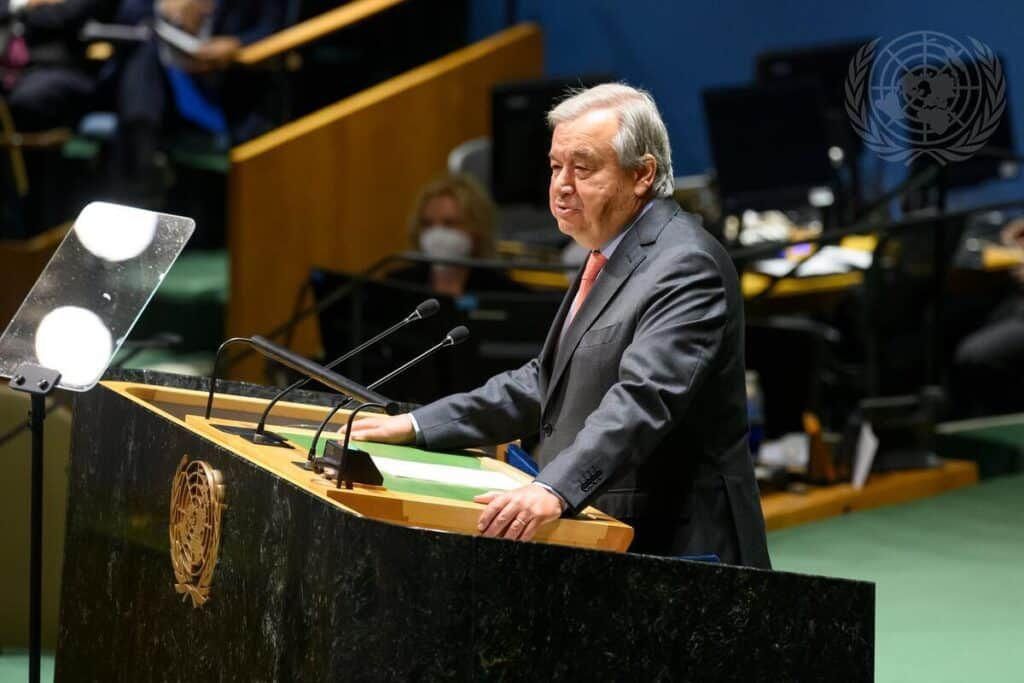UN Secretary-General: “the Doomsday Clock is a global alarm clock”
By François Diaz-Maurin | February 6, 2023
 UN Secretary-General António Guterres delivers remarks at the opening meeting the Tenth Review Conference of the Nuclear Non-Proliferation Treaty in August 2022. On Monday, before the General Assembly, the secretary-general highlighted his nuclear concerns and extended them to the full range of existential threats the world faces. (Image UN Photo/Loey Felipe)
UN Secretary-General António Guterres delivers remarks at the opening meeting the Tenth Review Conference of the Nuclear Non-Proliferation Treaty in August 2022. On Monday, before the General Assembly, the secretary-general highlighted his nuclear concerns and extended them to the full range of existential threats the world faces. (Image UN Photo/Loey Felipe)
In opening his annual remarks to the United Nations General Assembly in New York, UN Secretary-General António Guterres emphasized the need for member countries to address the dire international security situation, as described in this year’s Doomsday Clock statement. Members of the Bulletin’s Science and Security Board “surveyed the state of the world—the Russian invasion of Ukraine, runaway climate catastrophe, rising nuclear threats, the undermining of global norms and institutions. And they came to a clear conclusion,” Guterres said. “The Doomsday Clock is now 90 seconds to midnight, or total global catastrophe.”
“This is the closest the clock has ever stood to humanity’s darkest hour—closer than even during the height of the Cold War,” he added.
The secretary-general’s remarks came as part of his report on UN activities and his priorities for 2023, which clearly include dealing with major existential risks that the international community faces. Guterres also warned about a “confluence of challenges,” from climate change to financial and economic issues.
On January 24, the Bulletin’s Science and Security Board moved the hands of the Doomsday Clock forward to 90 seconds to midnight—the closest to global catastrophe it has ever been. In its statement, the board explained that its decision came “largely (though not exclusively) because of the mounting dangers of the war in Ukraine.”
The day after the announcement, the Russian government reacted to the Doomsday Clock announcement. Speaking to reporters, Kremlin spokesman Dmitry Peskov expressed alarm over the Clock, saying that “the situation as a whole is really alarming.” But Peskov was quick to blame the United States and NATO for the danger the war in Ukraine poses, adding that Russia had “to be particularly careful, to be alert, and to take appropriate measures.” Experts interpreted the “appropriate measures” language as a reference to Russia’s nuclear forces—an irony given the Clock statement’s denounced “Russia’s thinly veiled threats to use nuclear weapons” during its invasion of Ukraine.
Guterres shared his concern about nuclear risk last year when he opened the Tenth Review Conference of the Nuclear Non-Proliferation Treaty by declaring: “Today, humanity is just one misunderstanding, one miscalculation away from nuclear annihilation.” But, in the first year of the war in Ukraine, the international community has condemned Russia’s nuclear threats but has been largely unable to formulate concrete responses to them.
On Monday, the secretary-general highlighted his nuclear concerns and extended them to the full range of existential threats the world faces. “In truth, the Doomsday Clock is a global alarm clock,” he said, concluding his annual remarks by calling for leaders to act to turn back the Clock. “We need to wake up—and get to work.”
In the Clock statement’s additional information on the current dangers posed by nuclear weapons, the Bulletin’s Science and Security Board recommended, as a matter of priority, that “all five permanent members of the UN Security Council—including, especially, Russia—should make a renewed commitment to confront nuclear dangers through arms control efforts and strategic stability agreements.” The board also identified priorities to reduce other manmade existential threats, including climate change, biological events, and the misuse of other disruptive technologies.
Rachel Bronson, president and CEO of the Bulletin, welcomed the secretary-general’s remarks: “This year’s Doomsday Clock statement makes clear that Russia’s invasion of Ukraine undermined global norms and institutions, increased nuclear risk, and reduced the ability to mitigate runaway climate change. As Secretary-General Guterres noted, the Doomsday Clock is a global alarm clock, and we strongly support his clarion call for leaders around the world to ‘get to work.’
“With the Doomsday Clock now set at 90 seconds to midnight, there is no time to waste.”
Together, we make the world safer.
The Bulletin elevates expert voices above the noise. But as an independent nonprofit organization, our operations depend on the support of readers like you. Help us continue to deliver quality journalism that holds leaders accountable. Your support of our work at any level is important. In return, we promise our coverage will be understandable, influential, vigilant, solution-oriented, and fair-minded. Together we can make a difference.















